
Munowenyu stirs youths at Sakubva Discovery Ambulance Services Presidential Medical outreach
January 17, 2025
Prepaid smart water meters pilot trial for Mutare by end of February: Chafesuka
February 12, 2025African Identity Advocates launches pilot programmes in Mutare to support new Heritage-Based Curriculum
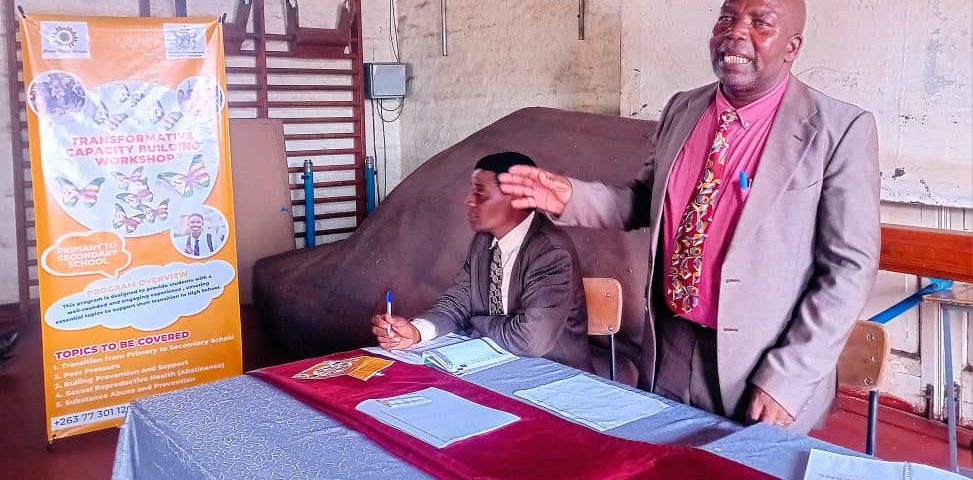
Ministry of Primary and Secondary Education, Mutare District schools inspector Edson Mapungwana (standing) officiating the Transformative Capacity Building Workshop for Form One students at Mutare Girls High School yesterday (Thursday).
Ngoni Dapira
A community based organization (CBO), African Identity Advocates, yesterday (Thursday) launched its pilot programmes in Mutare to support the new Heritage-Based Curriculum (HBC).
The programme dubbed, ‘Transformative Capacity Building Workshop’ targeted Form One students, schooling them through guidance and counseling to support their transition to High School. The focus is on highlighting the Afrocentric view on what moral values should be like in High Schools.
Launched this year, the Heritage Based Curriculum integrates the country’s cultural and historical heritage into the education system and is designed to promote a holistic approach to learning and to prepare students to drive national development.
The Mutare based CBO, African Identity Advocates, yesterday set off the pilot workshops at Dangamvura High School and Mutare Girls High School, whilst today they are in Chikanga at St Mary’s Secondary and in Sakubva at Sakubva 1 Secondary.
Officiating the workshop at Mutare Girls High School, the Ministry of Primary and Secondary Education Mutare District schools inspector, Edson Mapungwana said the initiative by African Identity Advocates was timely to cover a gap on growing trends in schools of bullying, teenage pregnancies and drug abuse.
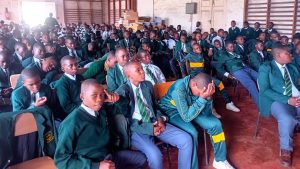
Part of the Form One students from Mutare Boys High, Mutare Girls High and Face to Face Academy that attended the workshop.
“We want a conducive learning environment in our schools. This initiative is supposed to teach our children in Form One how to cope in High School. We want to catch them young and inculcate moral values in them through the Heritage Based Curriculum and such initiatives. We realised that we are losing a lot of kids during this Form One transition. We appreciate these interventions to help by organisations such as African Identity Advocates,” said Mapungwana.
Mutare Boys High School guidance and counseling teacher Misheck Chapungu speaking on bullying castigated bullying and encouraged all schools to use what he termed a ‘Mukuru Box’ for anonymous whistle blowing on bullying or any immoral activities.
“The Mukuru Box is anonymous so it will help teachers to know what is happening through tip offs by the students,” he said.
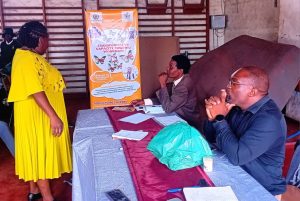
The presenters at the workshop, Winnet Madzivire (standing), Misheck Chapungu (left) and Ranganai Madanha (right).
Ministry of Primary and Secondary Education Manicaland Province psychologist Ranganai Madanha speaking on drug and substance abuse, illustrated the effects of drugs through what he called a balloon dream protection game.
He called up a few volunteers and gave them pieces of paper to write their dreams. He then gave each of them a balloon and put the paper inside then blow it.
“The balloon is the protective environment for your dream which you have placed inside,” said Madanha as he instructed the volunteers.
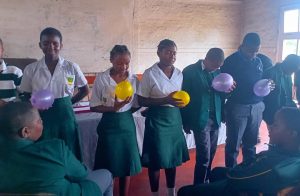
Student volunteers during the balloon dream protection exercise.
He then gave each volunteer a toothpick as a present. Shortly afterwards he instructed everyone to protect their dream from each other and see who would survive as they tussled with each other to pop the balloons.
“The toothpick is an example of how drugs work. They come as presents or pleasurable things, but in the end they are dream killers. They will destroy your environment, just like the popped balloons, and eventually your career and your dreams, so please let us refrain from drugs,” emphasized Madanha.
Mutare District Remedial tutor in the Ministry of Primary and Secondary Education Winnet Madzivire said guidance and counseling through the Heritage Based Curriculum will fill in the void of aunts and uncles that traditionally used to be advisors to children in the old days.
“To you Form Ones we are encouraging abstinence from sexual activities. We are the modern day aunts and uncles (vana tete nana sekuru). Through these platforms of guidance and counseling we teach you the moral fabrics and abstinence is best than to encourage safe sex through contraceptives to you teenagers under 18 years,” she said.
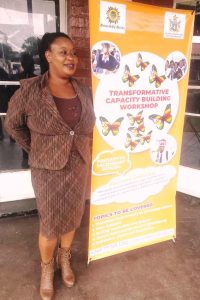
Lynette Mudehwe
African Identity Advocates founding coordinator Lynette Mudehwe said their organization is a consortium of teachers, community leaders and artists, specializing on the issues of African heritage and culture in the education system.
“Our work is to complement the government which introduced the Heritage Based Curriculum which is bound in nurturing Ubuntu. So our work will focus on the role of African culture and arts in education for national development towards the attainment of vision 2030 of an upper middle income economy that will be anchored on Afrocentric and heritage based production,” said Mudehwe.
She applauded the government for realizing that as a nation it is now time to go back to our own ethos, spirituality and culture in learning despite pushing for modernity, which often comes with Eurocentric conceptions, citing Education 5.0 and the new Heritage Based Curriculum as a good start.
“This year we started with the ‘Transformative Building Capacity Workshops’ for Form One students. We are teaching students to abstain from sexual activities, which is what our culture encourages and not the Eurocentric version. We are also encouraging ubuntu to counter bullying in schools,” she said.
Mudehwe added that to meet Sustainable Development Goal 4, in particular, which aims to “ensure inclusive and equitable quality education and promote lifelong learning opportunities for all” by 2030, the Heritage Based Curriculum comes at the right time to cover gaps which were lagging the process.
Education 5.0 which was adopted in 2020 is a modern educational model that uses technology, research, and community service to improve people’s lives. It aims to create graduates who can solve real-world problems and drive industrial growth.
The initiative by African Identity Advocates also comes as Zimbabwe today joined the rest of the world to commemorate the International Day of Education. The United Nations General Assembly proclaimed 24 January as International Day of Education, in celebration of the role of education for peace and development.
Education is a human right according to UNESCO. The right to education is enshrined in article 26 of the Universal Declaration of Human Rights. The declaration calls for free and compulsory elementary education, whilst the Convention on the Rights of the Child, adopted in 1989, goes further to stipulate that countries should make higher education accessible to all.
Running under the theme “AI (Artificial Intelligence) and education: Preserving human agency in a world of automation”, the 2025 International Day of Education encourages reflections on the power of education to equip individuals and communities to navigate, understand and influence technological advancement.
As computer and AI-driven systems become more sophisticated, the boundaries between human intention and machine-driven action often blur, raising critical questions about how to preserve, redefine, and, ideally, elevate human agency in an age of technological acceleration.


